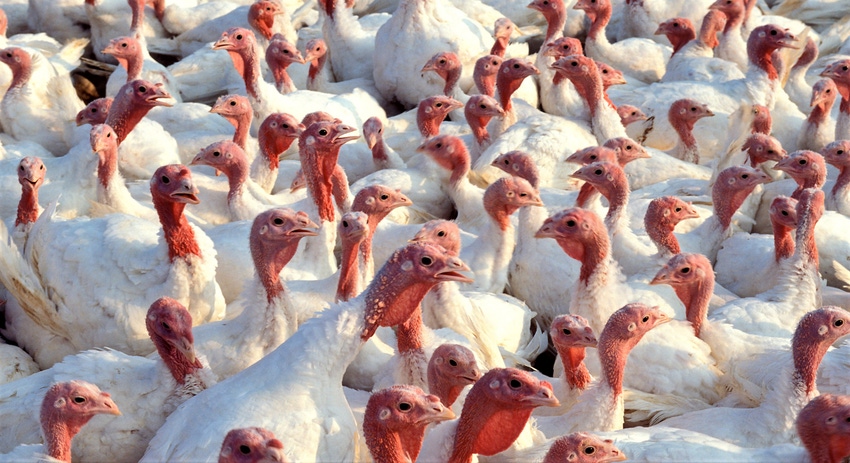November 18, 2022

Wild and domesticated birds have faced a renewed risk from highly pathogenic avian influenza this fall, and experts say the strain is only likely to increase in the coming months.
That's bad news for the West's agriculture sector, explains Utah State University Extension poultry specialist Dr. David Frame.
“Commercial turkey, layer, and gamebird producers are very concerned about this strain of HPAI,” Frame said. “When infected, all birds are depopulated on the premises.”
In other words, producers lose all of the time and money invested in their birds. That includes not just the cost of the animal itself, but also the resources used to care for it and future income from eggs or meat.
Related: Avian flu roaring back in West, nation
“HPAI is causing losses in many of the largest poultry-producing states in the United States,” Frame said. “This will have a negative effect on the availability of eggs and turkey particularly. We will likely encounter increased prices for turkey for the fourth-quarter holiday season.”
The threat of HPAI has been rising again in the West, as multiple new detections this fall have prompted agriculture officials throughout the region to remind flock owners to take precautions. A non-commercial flock owner southwest of Portland, Ore., who sells eggs to the public is among the latest to encounter the disease, causing his flock of about 100 birds to be euthanized.
HPAI has ravaged the Midwest. The disease recently infected a flock of about 1.1 million egg-laying chickens in north-central Iowa after more than 13 million commercial and backyard birds in the state died of the disease or were killed to prevent the spread this spring.
Nevada outbreaks
The Nevada Department of Agriculture announced earlier this month it has quarantined properties with confirmed cases of HPAI in domestic birds and surrounding areas will be monitored to protect further spread of the disease. As of Nov. 10, one premises in Nye County, Nev., remained under quarantine.
“We understand the concern and the NDA and Nevada Department of Wildlife continue to monitor positive cases across the state,” said NDA interim state veterinarian Dr. JJ Goicoechea.
In Utah, the state Department of Agriculture and Food is greatly concerned about outbreaks of HPAI, especially after severe cases in the turkey populations in Sanpete County earlier this year.
According to industry website WattPoultry.com, another case of HPAI was reported in Sanpete County, Utah, on Oct. 25. This latest case reported by the USDA’s Animal and Plant Health Inspection Service means 701,600 commercial turkeys have been affected in the U.S. this year.
USU says the reason for the increased spread of the virus now is the same as when the virus first took hold last spring: seasonal migration.
“In the autumn months, there is an increased risk of exposure to HPAI because of the waterfowl migration,” Frame said. “Waterfowl, especially dabbling ducks, are the primary reservoir for all avian influenza subtypes, including the HPAI now widely circulating within the U.S.”
While any infected bird can spread the disease, ducks and other waterfowl are particularly likely to do so because of the distances they travel and the amount of time they spend in lakes and rivers, which can lead to fecal contamination of water sources.
'Owners should be vigilant'
“All domestic bird owners should be vigilant in watching for signs of the disease and increasing biosecurity measures for their flocks,” read a statement from the UDAF. “If possible, birds should be kept locked inside enclosures to avoid contact with migratory birds. Flocks should not have shared water, feed, or grazing sources with wild bird habitats.”
Producers and other people with birds should be on the lookout for high mortality in bird flocks, nasal discharge, lack of coordination, and decreased appetite or water consumption. If birds experience one or more of these symptoms, it should be reported to the state veterinarian immediately.
HPAI hasn’t proven to be a threat to humans, but people are still able to spread the disease, warned Dr. Shawn Zimmerman, a professor of veterinary clinical pathology at Utah State.
“You can spread avian influenza just as easily as your bird,” Zimmerman said. “In particular, contaminated hands and feet are very prone to transmitting the virus.”
Zimmerman recommends thoroughly washing your hands after contact with a bird or flock. Because the virus also lingers on clothing, shoes and possibly other clothes worn while caring for birds should not be used anywhere else.
Source: Utah State University, Nevada Department of Agriculture, Oregon Department of Agriculture
About the Author(s)
You May Also Like




